Health and Social Care: Discrimination, Labelling, and Stigma Effects
VerifiedAdded on 2020/11/12
|7
|1983
|195
Report
AI Summary
This report delves into the critical issues of discrimination, labelling, and stigma within health and social care, focusing on their profound impact on service users, especially those suffering from dementia. The introduction defines health and social care, and dementia as a condition marked by cognitive decline. The main body explores the effects of discrimination, highlighting how individuals with dementia face social rejection, difficulty in daily tasks, and secondary health issues like depression and anxiety. It also examines the impact of labelling, which can negatively affect self-perception and social interaction, while also offering the potential for seeking professional help. Furthermore, the report discusses stigma, emphasizing its role in causing reluctance to seek assistance and social isolation. The conclusion synthesizes the report's findings, underscoring the need for compassionate and informed care to mitigate the negative consequences of discrimination, labelling, and stigma on dementia patients. The report draws on several sources, which are included in the references section.
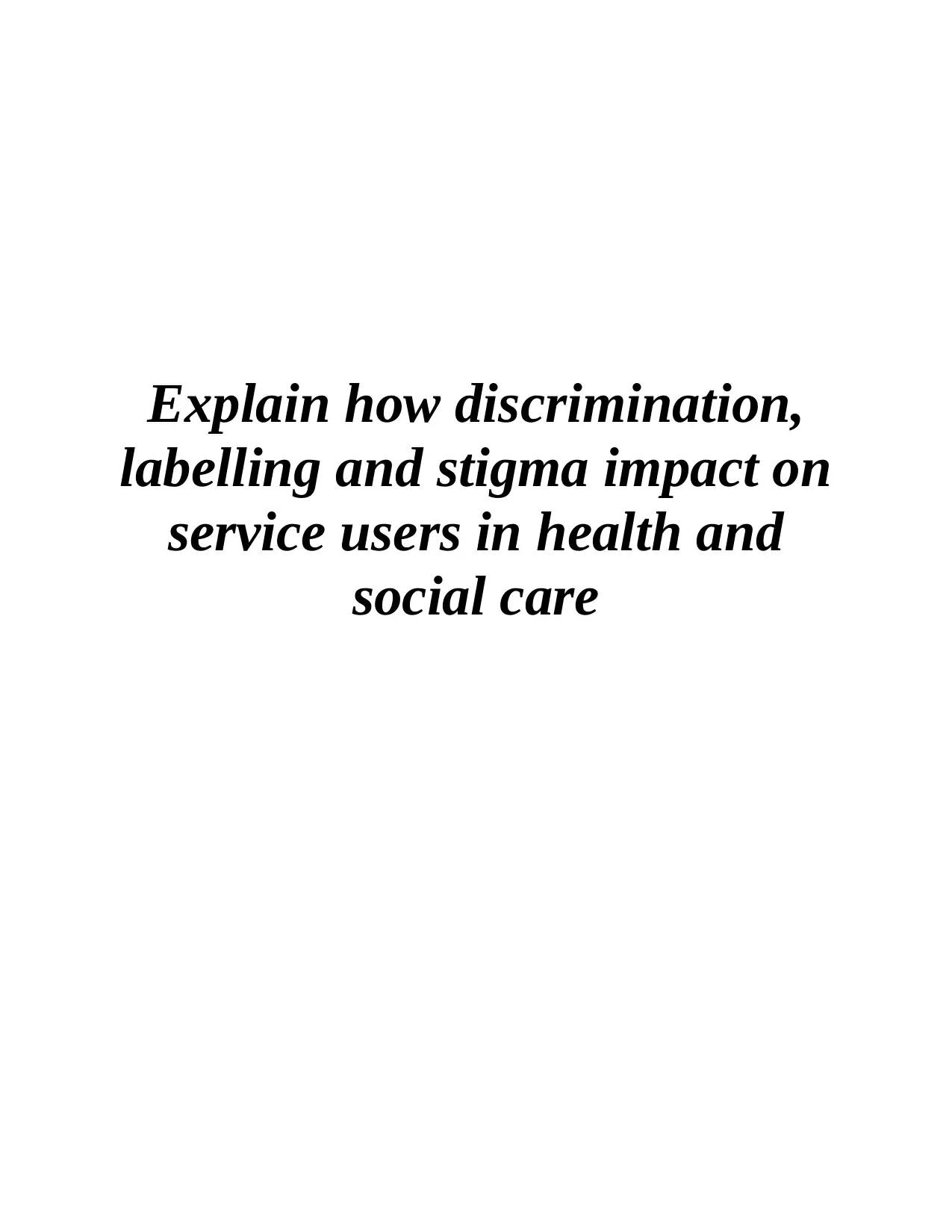
Explain how discrimination,
labelling and stigma impact on
service users in health and
social care
labelling and stigma impact on
service users in health and
social care
Paraphrase This Document
Need a fresh take? Get an instant paraphrase of this document with our AI Paraphraser
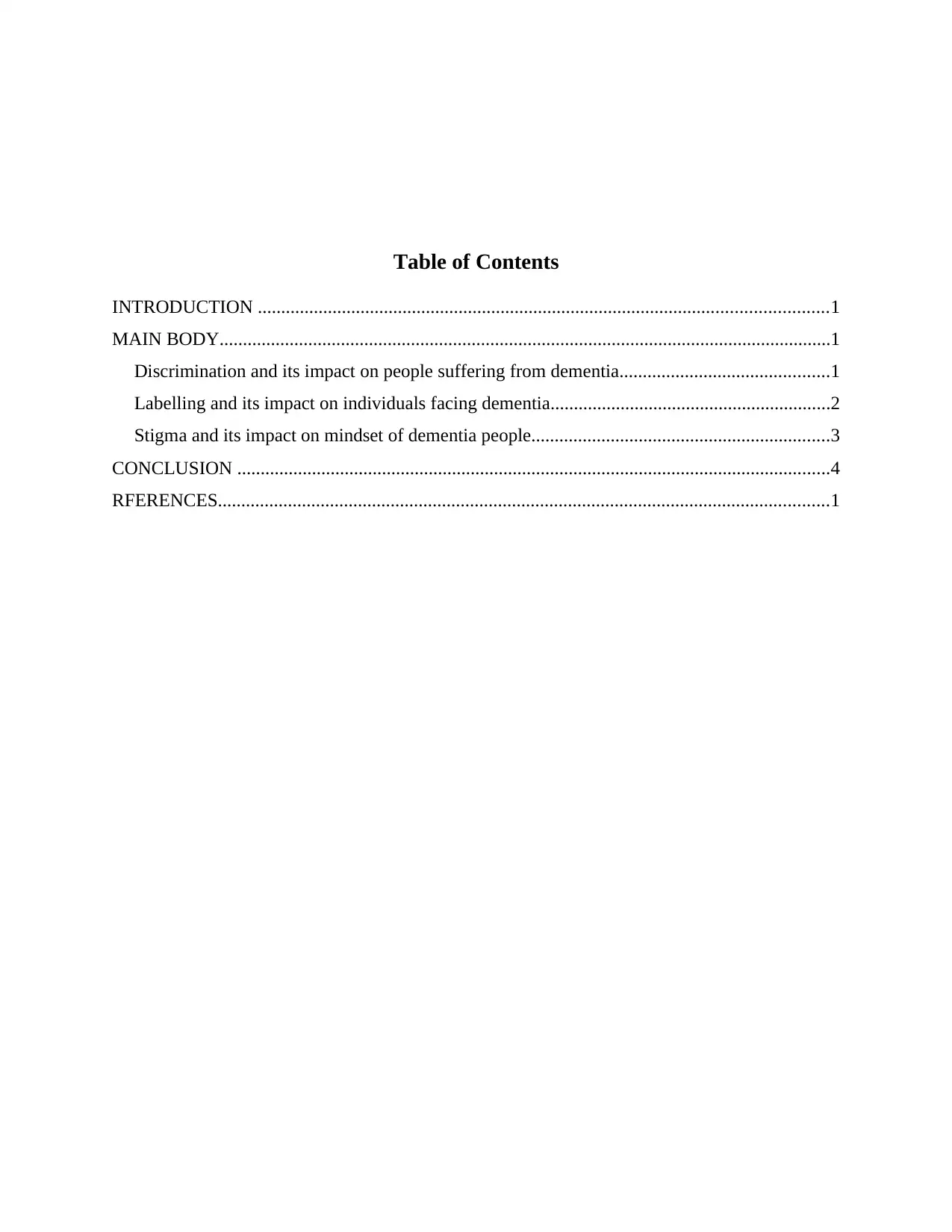
Table of Contents
INTRODUCTION ..........................................................................................................................1
MAIN BODY...................................................................................................................................1
Discrimination and its impact on people suffering from dementia.............................................1
Labelling and its impact on individuals facing dementia............................................................2
Stigma and its impact on mindset of dementia people................................................................3
CONCLUSION ...............................................................................................................................4
RFERENCES...................................................................................................................................1
INTRODUCTION ..........................................................................................................................1
MAIN BODY...................................................................................................................................1
Discrimination and its impact on people suffering from dementia.............................................1
Labelling and its impact on individuals facing dementia............................................................2
Stigma and its impact on mindset of dementia people................................................................3
CONCLUSION ...............................................................................................................................4
RFERENCES...................................................................................................................................1

INTRODUCTION
Health and social care is defined as the treatment of medical and health conditions in
health centres, community and hospitals. Social care is referred to the support and care of
vulnerable individuals specially within a community (Brooker and Latham, 2015). These generic
terms helps in defining the entire health care provision, public and private infrastructure. This
report is written in context with dementia which is a decline in mental stability of a person. This
condition can severely disrupt the daily life of an individual due to conditions like memory loss.
This report will cover about discrimination, labelling and stigma which is faced by dementia
people along with its impact on service users.
MAIN BODY
Discrimination and its impact on people suffering from dementia
Discrimination is referred to a condition in which an individual faces distinction due to its
group, category or class. A person can be discriminated on several grounds such as criminal
record, colour, disability, family status, medical condition, illness, stereotypes etc. People with
health issues, mental illness and disabilities faces discriminations and distinctions in their
workplace and social life. Discrimination against individuals with addiction disabilities and
mental health is associated with negative serotypes, overall stigma and prejudicial attitudes
which surrounds these disabilities. In some cases discrimination is not intentional but it can
impacts the feelings of victims in a negative manner. As dementia is defined as a group of
diseases and symptoms which impacts thinking, memory and social abilities of a person. It is not
a single disease but facing many diseases can cause dementia (Clement and et. al., 2015).
People which face dementia are prone to social rejections and discriminations. Due to
which, these individuals loses their friends as their abilities and mental state is misconcepted by
other people near to them. People with dementia faces issues like difficulty in organising ,
planning work, communicating, identifying words, memory loss, confusion, disorientation,
performing day to day tasks etc. Due to discrimination on the basis of their work performing
capability and mental state, individuals with dementia are prone to some other diseases. These
other diseases are depression, paranoia, hallucinations, anxiety, personality change and
inappropriate behaviour.
Impact of discrimination
1
Health and social care is defined as the treatment of medical and health conditions in
health centres, community and hospitals. Social care is referred to the support and care of
vulnerable individuals specially within a community (Brooker and Latham, 2015). These generic
terms helps in defining the entire health care provision, public and private infrastructure. This
report is written in context with dementia which is a decline in mental stability of a person. This
condition can severely disrupt the daily life of an individual due to conditions like memory loss.
This report will cover about discrimination, labelling and stigma which is faced by dementia
people along with its impact on service users.
MAIN BODY
Discrimination and its impact on people suffering from dementia
Discrimination is referred to a condition in which an individual faces distinction due to its
group, category or class. A person can be discriminated on several grounds such as criminal
record, colour, disability, family status, medical condition, illness, stereotypes etc. People with
health issues, mental illness and disabilities faces discriminations and distinctions in their
workplace and social life. Discrimination against individuals with addiction disabilities and
mental health is associated with negative serotypes, overall stigma and prejudicial attitudes
which surrounds these disabilities. In some cases discrimination is not intentional but it can
impacts the feelings of victims in a negative manner. As dementia is defined as a group of
diseases and symptoms which impacts thinking, memory and social abilities of a person. It is not
a single disease but facing many diseases can cause dementia (Clement and et. al., 2015).
People which face dementia are prone to social rejections and discriminations. Due to
which, these individuals loses their friends as their abilities and mental state is misconcepted by
other people near to them. People with dementia faces issues like difficulty in organising ,
planning work, communicating, identifying words, memory loss, confusion, disorientation,
performing day to day tasks etc. Due to discrimination on the basis of their work performing
capability and mental state, individuals with dementia are prone to some other diseases. These
other diseases are depression, paranoia, hallucinations, anxiety, personality change and
inappropriate behaviour.
Impact of discrimination
1
⊘ This is a preview!⊘
Do you want full access?
Subscribe today to unlock all pages.

Trusted by 1+ million students worldwide
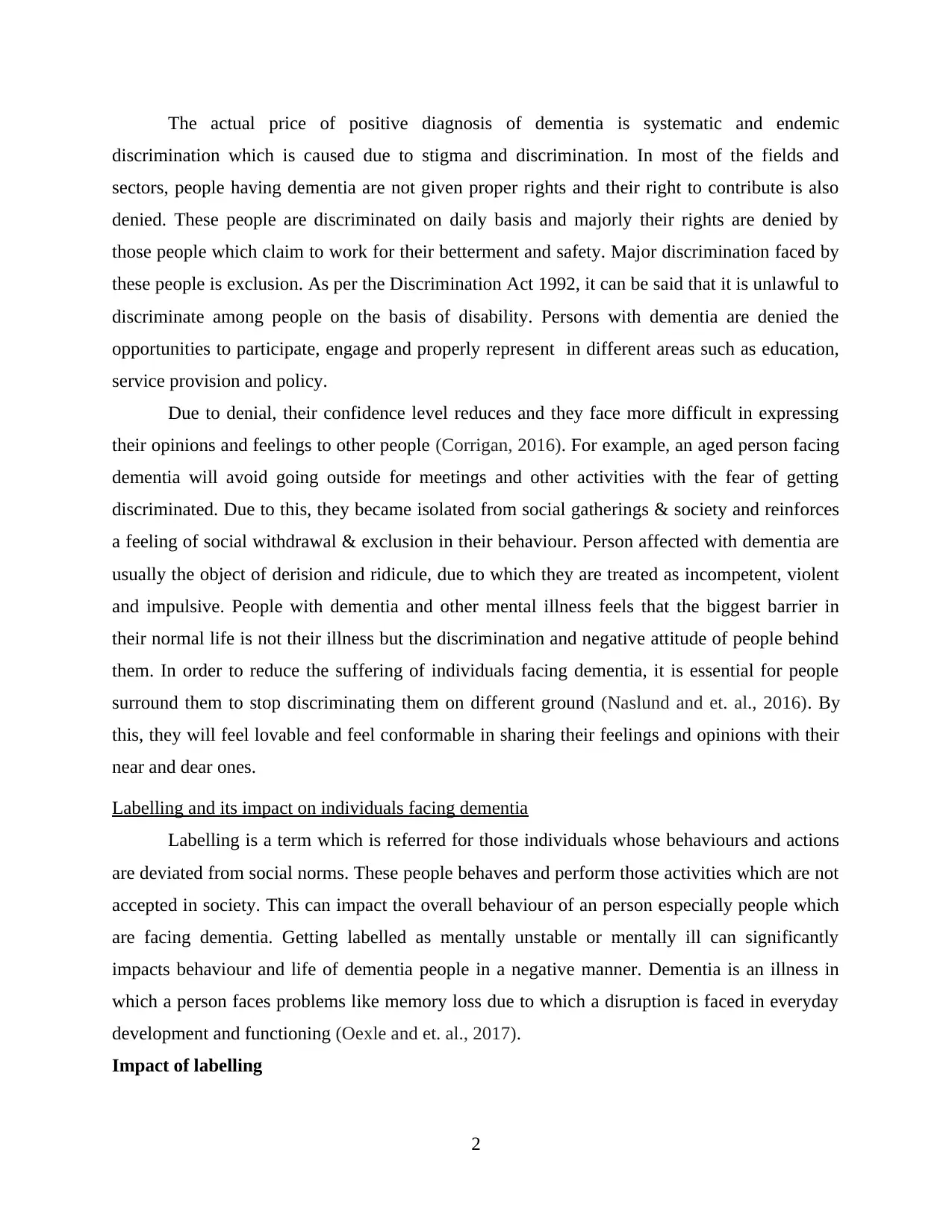
The actual price of positive diagnosis of dementia is systematic and endemic
discrimination which is caused due to stigma and discrimination. In most of the fields and
sectors, people having dementia are not given proper rights and their right to contribute is also
denied. These people are discriminated on daily basis and majorly their rights are denied by
those people which claim to work for their betterment and safety. Major discrimination faced by
these people is exclusion. As per the Discrimination Act 1992, it can be said that it is unlawful to
discriminate among people on the basis of disability. Persons with dementia are denied the
opportunities to participate, engage and properly represent in different areas such as education,
service provision and policy.
Due to denial, their confidence level reduces and they face more difficult in expressing
their opinions and feelings to other people (Corrigan, 2016). For example, an aged person facing
dementia will avoid going outside for meetings and other activities with the fear of getting
discriminated. Due to this, they became isolated from social gatherings & society and reinforces
a feeling of social withdrawal & exclusion in their behaviour. Person affected with dementia are
usually the object of derision and ridicule, due to which they are treated as incompetent, violent
and impulsive. People with dementia and other mental illness feels that the biggest barrier in
their normal life is not their illness but the discrimination and negative attitude of people behind
them. In order to reduce the suffering of individuals facing dementia, it is essential for people
surround them to stop discriminating them on different ground (Naslund and et. al., 2016). By
this, they will feel lovable and feel conformable in sharing their feelings and opinions with their
near and dear ones.
Labelling and its impact on individuals facing dementia
Labelling is a term which is referred for those individuals whose behaviours and actions
are deviated from social norms. These people behaves and perform those activities which are not
accepted in society. This can impact the overall behaviour of an person especially people which
are facing dementia. Getting labelled as mentally unstable or mentally ill can significantly
impacts behaviour and life of dementia people in a negative manner. Dementia is an illness in
which a person faces problems like memory loss due to which a disruption is faced in everyday
development and functioning (Oexle and et. al., 2017).
Impact of labelling
2
discrimination which is caused due to stigma and discrimination. In most of the fields and
sectors, people having dementia are not given proper rights and their right to contribute is also
denied. These people are discriminated on daily basis and majorly their rights are denied by
those people which claim to work for their betterment and safety. Major discrimination faced by
these people is exclusion. As per the Discrimination Act 1992, it can be said that it is unlawful to
discriminate among people on the basis of disability. Persons with dementia are denied the
opportunities to participate, engage and properly represent in different areas such as education,
service provision and policy.
Due to denial, their confidence level reduces and they face more difficult in expressing
their opinions and feelings to other people (Corrigan, 2016). For example, an aged person facing
dementia will avoid going outside for meetings and other activities with the fear of getting
discriminated. Due to this, they became isolated from social gatherings & society and reinforces
a feeling of social withdrawal & exclusion in their behaviour. Person affected with dementia are
usually the object of derision and ridicule, due to which they are treated as incompetent, violent
and impulsive. People with dementia and other mental illness feels that the biggest barrier in
their normal life is not their illness but the discrimination and negative attitude of people behind
them. In order to reduce the suffering of individuals facing dementia, it is essential for people
surround them to stop discriminating them on different ground (Naslund and et. al., 2016). By
this, they will feel lovable and feel conformable in sharing their feelings and opinions with their
near and dear ones.
Labelling and its impact on individuals facing dementia
Labelling is a term which is referred for those individuals whose behaviours and actions
are deviated from social norms. These people behaves and perform those activities which are not
accepted in society. This can impact the overall behaviour of an person especially people which
are facing dementia. Getting labelled as mentally unstable or mentally ill can significantly
impacts behaviour and life of dementia people in a negative manner. Dementia is an illness in
which a person faces problems like memory loss due to which a disruption is faced in everyday
development and functioning (Oexle and et. al., 2017).
Impact of labelling
2
Paraphrase This Document
Need a fresh take? Get an instant paraphrase of this document with our AI Paraphraser
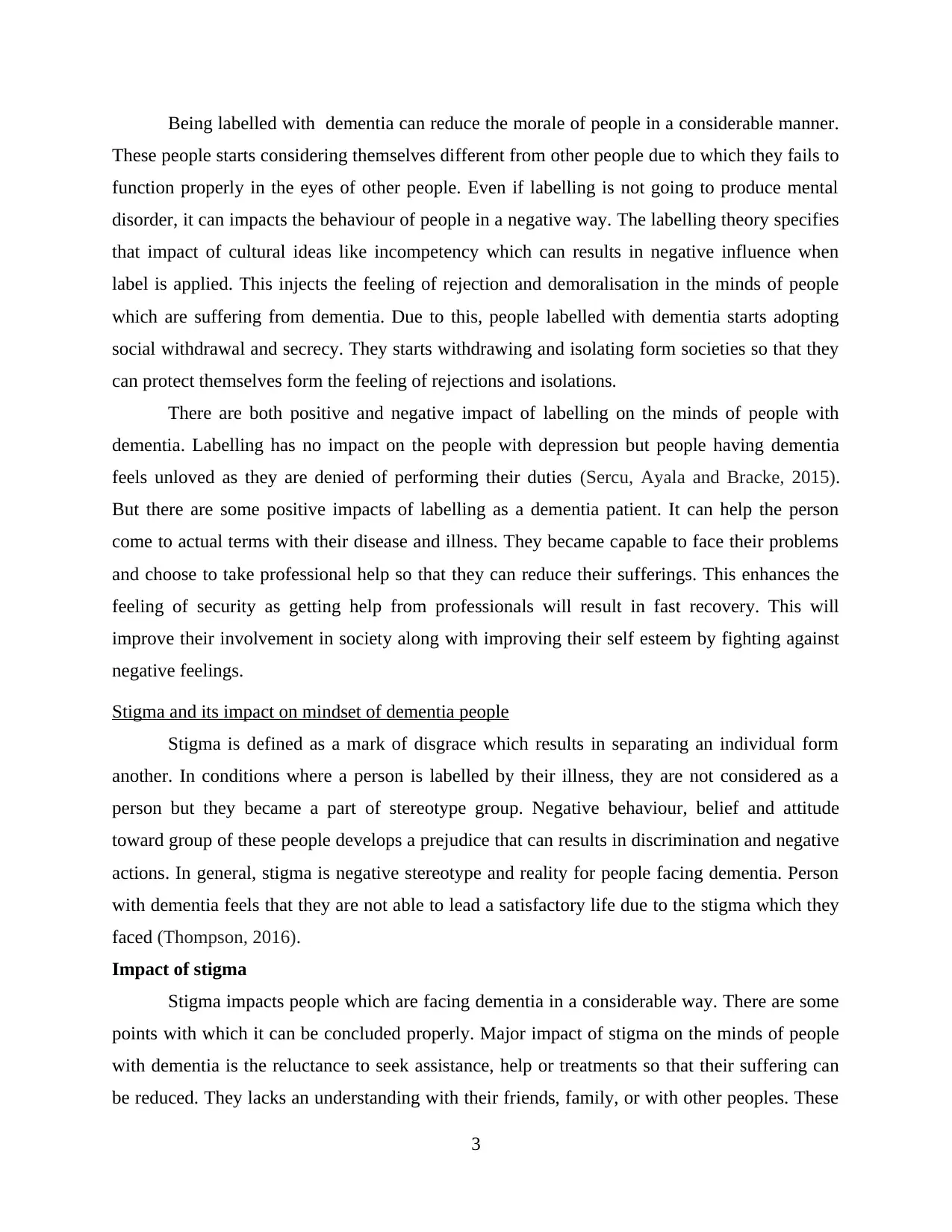
Being labelled with dementia can reduce the morale of people in a considerable manner.
These people starts considering themselves different from other people due to which they fails to
function properly in the eyes of other people. Even if labelling is not going to produce mental
disorder, it can impacts the behaviour of people in a negative way. The labelling theory specifies
that impact of cultural ideas like incompetency which can results in negative influence when
label is applied. This injects the feeling of rejection and demoralisation in the minds of people
which are suffering from dementia. Due to this, people labelled with dementia starts adopting
social withdrawal and secrecy. They starts withdrawing and isolating form societies so that they
can protect themselves form the feeling of rejections and isolations.
There are both positive and negative impact of labelling on the minds of people with
dementia. Labelling has no impact on the people with depression but people having dementia
feels unloved as they are denied of performing their duties (Sercu, Ayala and Bracke, 2015).
But there are some positive impacts of labelling as a dementia patient. It can help the person
come to actual terms with their disease and illness. They became capable to face their problems
and choose to take professional help so that they can reduce their sufferings. This enhances the
feeling of security as getting help from professionals will result in fast recovery. This will
improve their involvement in society along with improving their self esteem by fighting against
negative feelings.
Stigma and its impact on mindset of dementia people
Stigma is defined as a mark of disgrace which results in separating an individual form
another. In conditions where a person is labelled by their illness, they are not considered as a
person but they became a part of stereotype group. Negative behaviour, belief and attitude
toward group of these people develops a prejudice that can results in discrimination and negative
actions. In general, stigma is negative stereotype and reality for people facing dementia. Person
with dementia feels that they are not able to lead a satisfactory life due to the stigma which they
faced (Thompson, 2016).
Impact of stigma
Stigma impacts people which are facing dementia in a considerable way. There are some
points with which it can be concluded properly. Major impact of stigma on the minds of people
with dementia is the reluctance to seek assistance, help or treatments so that their suffering can
be reduced. They lacks an understanding with their friends, family, or with other peoples. These
3
These people starts considering themselves different from other people due to which they fails to
function properly in the eyes of other people. Even if labelling is not going to produce mental
disorder, it can impacts the behaviour of people in a negative way. The labelling theory specifies
that impact of cultural ideas like incompetency which can results in negative influence when
label is applied. This injects the feeling of rejection and demoralisation in the minds of people
which are suffering from dementia. Due to this, people labelled with dementia starts adopting
social withdrawal and secrecy. They starts withdrawing and isolating form societies so that they
can protect themselves form the feeling of rejections and isolations.
There are both positive and negative impact of labelling on the minds of people with
dementia. Labelling has no impact on the people with depression but people having dementia
feels unloved as they are denied of performing their duties (Sercu, Ayala and Bracke, 2015).
But there are some positive impacts of labelling as a dementia patient. It can help the person
come to actual terms with their disease and illness. They became capable to face their problems
and choose to take professional help so that they can reduce their sufferings. This enhances the
feeling of security as getting help from professionals will result in fast recovery. This will
improve their involvement in society along with improving their self esteem by fighting against
negative feelings.
Stigma and its impact on mindset of dementia people
Stigma is defined as a mark of disgrace which results in separating an individual form
another. In conditions where a person is labelled by their illness, they are not considered as a
person but they became a part of stereotype group. Negative behaviour, belief and attitude
toward group of these people develops a prejudice that can results in discrimination and negative
actions. In general, stigma is negative stereotype and reality for people facing dementia. Person
with dementia feels that they are not able to lead a satisfactory life due to the stigma which they
faced (Thompson, 2016).
Impact of stigma
Stigma impacts people which are facing dementia in a considerable way. There are some
points with which it can be concluded properly. Major impact of stigma on the minds of people
with dementia is the reluctance to seek assistance, help or treatments so that their suffering can
be reduced. They lacks an understanding with their friends, family, or with other peoples. These
3
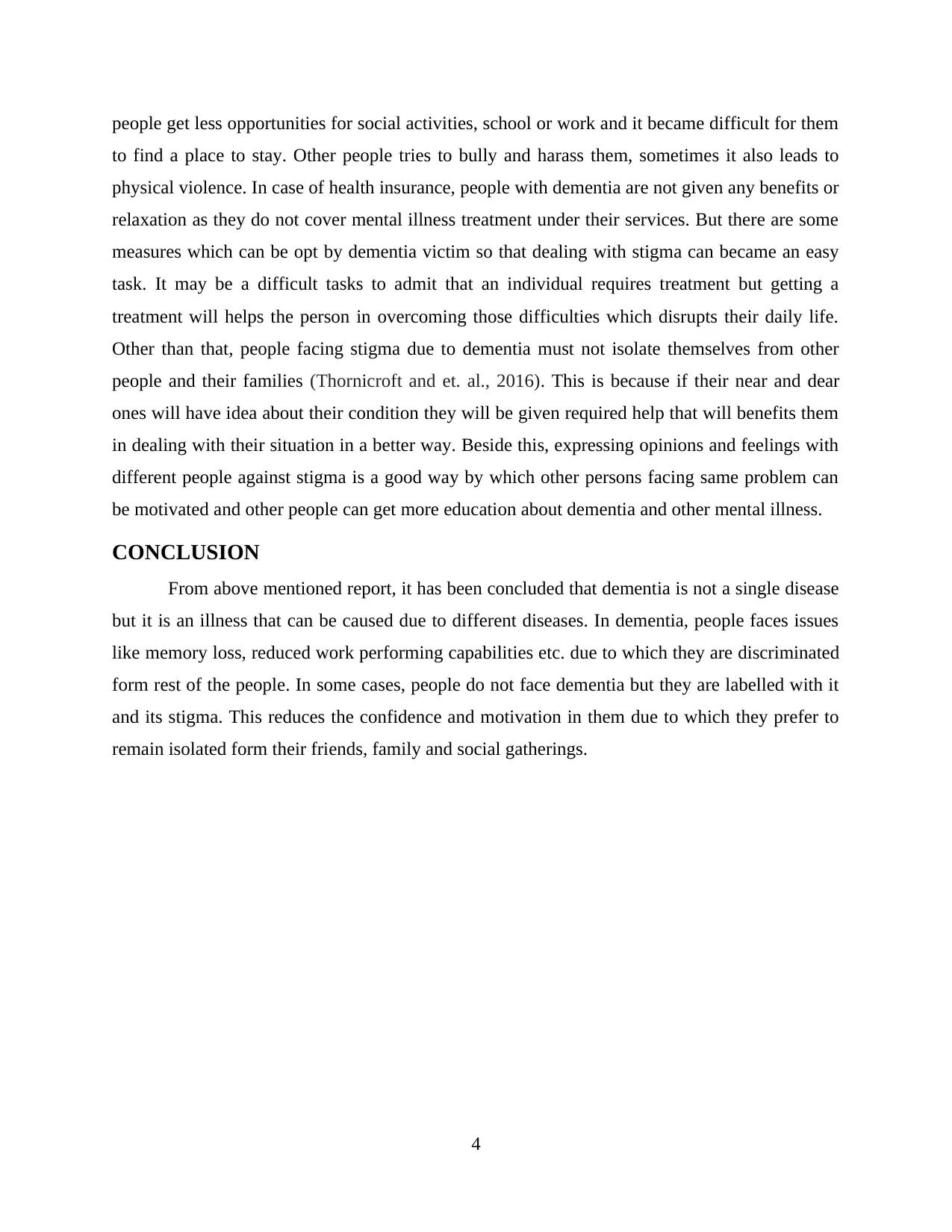
people get less opportunities for social activities, school or work and it became difficult for them
to find a place to stay. Other people tries to bully and harass them, sometimes it also leads to
physical violence. In case of health insurance, people with dementia are not given any benefits or
relaxation as they do not cover mental illness treatment under their services. But there are some
measures which can be opt by dementia victim so that dealing with stigma can became an easy
task. It may be a difficult tasks to admit that an individual requires treatment but getting a
treatment will helps the person in overcoming those difficulties which disrupts their daily life.
Other than that, people facing stigma due to dementia must not isolate themselves from other
people and their families (Thornicroft and et. al., 2016). This is because if their near and dear
ones will have idea about their condition they will be given required help that will benefits them
in dealing with their situation in a better way. Beside this, expressing opinions and feelings with
different people against stigma is a good way by which other persons facing same problem can
be motivated and other people can get more education about dementia and other mental illness.
CONCLUSION
From above mentioned report, it has been concluded that dementia is not a single disease
but it is an illness that can be caused due to different diseases. In dementia, people faces issues
like memory loss, reduced work performing capabilities etc. due to which they are discriminated
form rest of the people. In some cases, people do not face dementia but they are labelled with it
and its stigma. This reduces the confidence and motivation in them due to which they prefer to
remain isolated form their friends, family and social gatherings.
4
to find a place to stay. Other people tries to bully and harass them, sometimes it also leads to
physical violence. In case of health insurance, people with dementia are not given any benefits or
relaxation as they do not cover mental illness treatment under their services. But there are some
measures which can be opt by dementia victim so that dealing with stigma can became an easy
task. It may be a difficult tasks to admit that an individual requires treatment but getting a
treatment will helps the person in overcoming those difficulties which disrupts their daily life.
Other than that, people facing stigma due to dementia must not isolate themselves from other
people and their families (Thornicroft and et. al., 2016). This is because if their near and dear
ones will have idea about their condition they will be given required help that will benefits them
in dealing with their situation in a better way. Beside this, expressing opinions and feelings with
different people against stigma is a good way by which other persons facing same problem can
be motivated and other people can get more education about dementia and other mental illness.
CONCLUSION
From above mentioned report, it has been concluded that dementia is not a single disease
but it is an illness that can be caused due to different diseases. In dementia, people faces issues
like memory loss, reduced work performing capabilities etc. due to which they are discriminated
form rest of the people. In some cases, people do not face dementia but they are labelled with it
and its stigma. This reduces the confidence and motivation in them due to which they prefer to
remain isolated form their friends, family and social gatherings.
4
⊘ This is a preview!⊘
Do you want full access?
Subscribe today to unlock all pages.

Trusted by 1+ million students worldwide
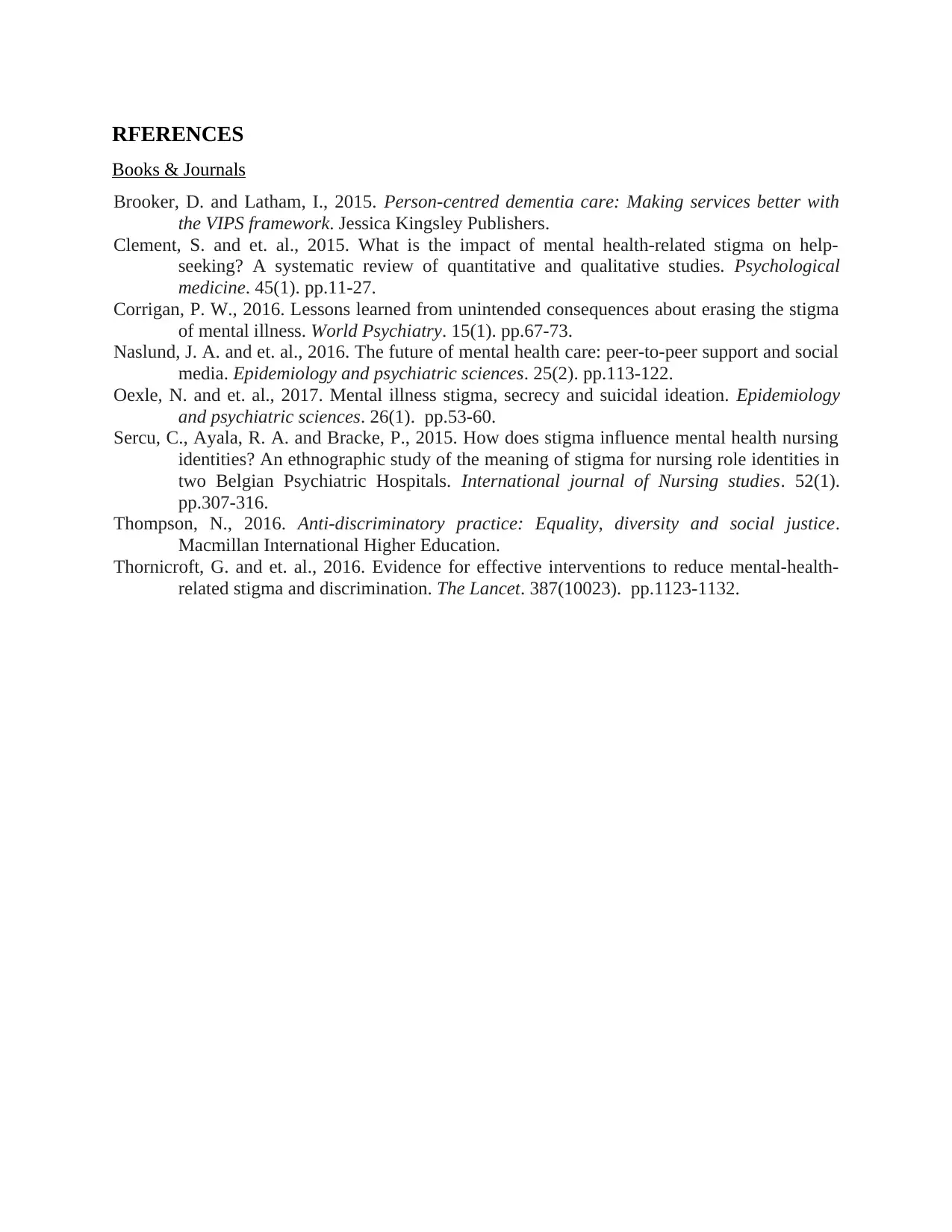
RFERENCES
Books & Journals
Brooker, D. and Latham, I., 2015. Person-centred dementia care: Making services better with
the VIPS framework. Jessica Kingsley Publishers.
Clement, S. and et. al., 2015. What is the impact of mental health-related stigma on help-
seeking? A systematic review of quantitative and qualitative studies. Psychological
medicine. 45(1). pp.11-27.
Corrigan, P. W., 2016. Lessons learned from unintended consequences about erasing the stigma
of mental illness. World Psychiatry. 15(1). pp.67-73.
Naslund, J. A. and et. al., 2016. The future of mental health care: peer-to-peer support and social
media. Epidemiology and psychiatric sciences. 25(2). pp.113-122.
Oexle, N. and et. al., 2017. Mental illness stigma, secrecy and suicidal ideation. Epidemiology
and psychiatric sciences. 26(1). pp.53-60.
Sercu, C., Ayala, R. A. and Bracke, P., 2015. How does stigma influence mental health nursing
identities? An ethnographic study of the meaning of stigma for nursing role identities in
two Belgian Psychiatric Hospitals. International journal of Nursing studies. 52(1).
pp.307-316.
Thompson, N., 2016. Anti-discriminatory practice: Equality, diversity and social justice.
Macmillan International Higher Education.
Thornicroft, G. and et. al., 2016. Evidence for effective interventions to reduce mental-health-
related stigma and discrimination. The Lancet. 387(10023). pp.1123-1132.
Books & Journals
Brooker, D. and Latham, I., 2015. Person-centred dementia care: Making services better with
the VIPS framework. Jessica Kingsley Publishers.
Clement, S. and et. al., 2015. What is the impact of mental health-related stigma on help-
seeking? A systematic review of quantitative and qualitative studies. Psychological
medicine. 45(1). pp.11-27.
Corrigan, P. W., 2016. Lessons learned from unintended consequences about erasing the stigma
of mental illness. World Psychiatry. 15(1). pp.67-73.
Naslund, J. A. and et. al., 2016. The future of mental health care: peer-to-peer support and social
media. Epidemiology and psychiatric sciences. 25(2). pp.113-122.
Oexle, N. and et. al., 2017. Mental illness stigma, secrecy and suicidal ideation. Epidemiology
and psychiatric sciences. 26(1). pp.53-60.
Sercu, C., Ayala, R. A. and Bracke, P., 2015. How does stigma influence mental health nursing
identities? An ethnographic study of the meaning of stigma for nursing role identities in
two Belgian Psychiatric Hospitals. International journal of Nursing studies. 52(1).
pp.307-316.
Thompson, N., 2016. Anti-discriminatory practice: Equality, diversity and social justice.
Macmillan International Higher Education.
Thornicroft, G. and et. al., 2016. Evidence for effective interventions to reduce mental-health-
related stigma and discrimination. The Lancet. 387(10023). pp.1123-1132.
1 out of 7
Related Documents
Your All-in-One AI-Powered Toolkit for Academic Success.
+13062052269
info@desklib.com
Available 24*7 on WhatsApp / Email
![[object Object]](/_next/static/media/star-bottom.7253800d.svg)
Unlock your academic potential
Copyright © 2020–2025 A2Z Services. All Rights Reserved. Developed and managed by ZUCOL.




